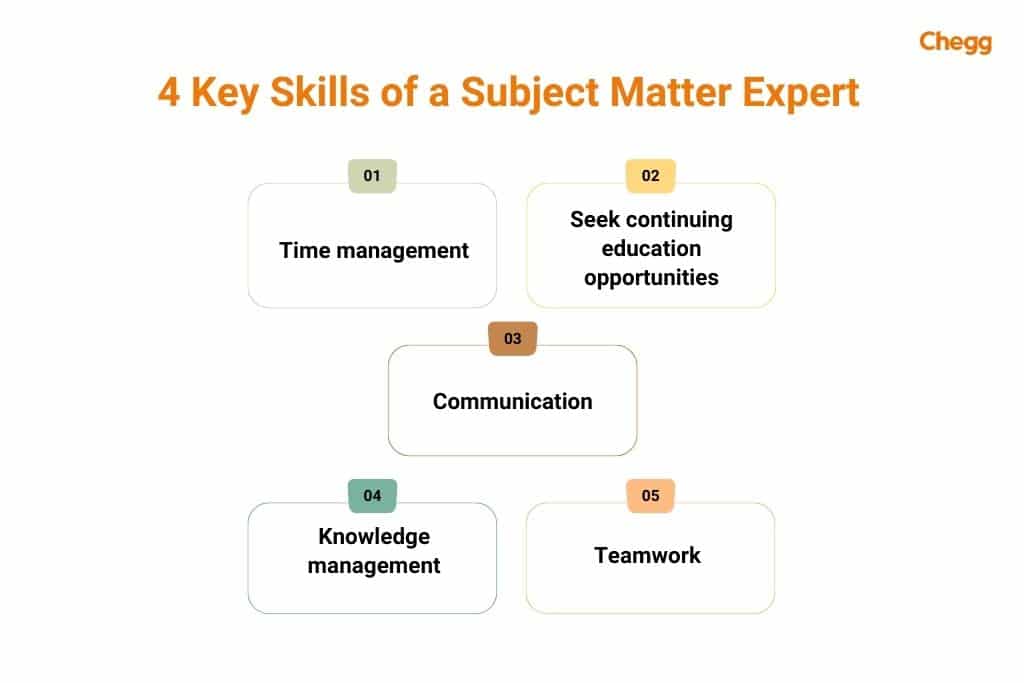What Does a Subject Matter Expert Do? Roles, Responsibilities and Key Skills (2025)


Quick Summary
- A Subject Matter Expert is someone with deep knowledge in a specific area, like IT, education etc.
- SMEs provide expert advice, ensure accurate work & help solve complex problems in their field.
- To become an SME, you need experience, skills, and continuous learning in your chosen area of expertise.
Table of Contents
In today’s busy world, businesses and organizations need experts to help them. A Subject Matter Expert (SME) is very important for making sure work is done well in different fields. But what does a Subject Matter Expert do? This guide will explain everything about SMEs, including what they do, their duties, the skills they need, and the job opportunities available for them.
What is a Subject Matter Expert?
A Subject Matter Expert (SME) is a professional who has extensive knowledge and experience in a specific area or field. They are recognized as authorities in their domain and are often called upon to provide expert advice, solve complex problems, and ensure the accuracy and quality of work related to their expertise.
What Does a Subject Matter Expert Do?
A Subject Matter Expert (SME) is a professional who has deep knowledge and experience in a specific field. Their main job is to provide expert advice, solve complex problems, and make sure that projects are accurate and high-quality. SMEs help businesses, organizations, and teams by sharing valuable insights, improving processes, and making informed decisions. They are often involved in training, creating content, and checking the quality of work to maintain high standards. Whether in IT, healthcare, finance, or any other industry, SMEs play a key role in ensuring success.
Organizations like Chegg India hire freelance Subject Matter Experts. These experts sign up on the website or are hired from campuses. They answer questions related to a specific subject posted by students from around the world and get paid for each question they answer. The average salary for a Subject Matter Expert is between ₹30,000 – ₹80,000 per month, and ₹2.4 Lakhs – ₹24 Lakhs per year.
Role of a Subject Matter Expert in Different Fields
Understanding what does a Subject Matter Expert do is essential as SMEs are recruited across various fields and industries where specialized knowledge is vital. Their roles and responsibilities vary depending on the industry and organizational needs. Here are some examples of how SMEs contribute in different areas:
1. Subject Matter Expert in Technology and IT
- Software Developer: Design and create software solutions, write code, and ensure the functionality of applications. What does a Subject Matter Expert do in this role? They provide specialized knowledge in software development to create efficient and reliable applications.
- Cybersecurity Expert: Identify and mitigate security risks, implement security measures, and safeguard digital assets. What does a Subject Matter Expert do here? They ensure the protection of digital information by applying their expertise in cybersecurity.
- Network Architect: Design and manage computer networks, ensuring optimal performance and security. What does a Subject Matter Expert do in this field? They create robust network infrastructures that support business operations.
2. Subject Matter Expert in Healthcare
- Medical Specialist: Provide expert medical advice, diagnose and treat patients, and contribute to medical research. What does a Subject Matter Expert do in healthcare? They offer specialized medical knowledge to improve patient care and advance medical science.
- Healthcare Manager: Oversee and manage healthcare facilities, ensuring efficient operations and compliance with regulations. What does a Subject Matter Expert do in this role? They ensure that healthcare services are delivered effectively and meet regulatory standards.
4. Subject Matter Expert in Finance and Banking
- Financial Analyst: Analyze financial data, prepare reports, and provide insights to support decision-making. What does a Subject Matter Expert do in finance? They use their expertise to guide financial planning and investment decisions.
- Investment Advisor: Offer expert advice on investment strategies, asset allocation, and financial planning. What does a Subject Matter Expert do here? They help clients make informed investment choices to achieve their financial goals.
5. Subject Matter Expert in Engineering
- Civil Engineer: Design and oversee the construction of infrastructure projects such as bridges, roads, and buildings. What does a Subject Matter Expert do in engineering? They apply their technical knowledge to ensure the successful completion of construction projects.
- Mechanical Engineer: Develop and test mechanical systems and devices, ensuring they meet industry standards. What does a Subject Matter Expert do in this field? They innovate and improve mechanical systems for various applications.
6. Subject Matter Expert in Education
- Subject-Specific Educator: Teach and provide expertise in a specific subject or field, contributing to the academic development of students. What does a Subject Matter Expert do in education? They enhance learning experiences by sharing their specialized knowledge.
7. Subject Matter Expert in Marketing and Advertising
- Digital Marketing Specialist: Develop and implement digital marketing strategies, analyze campaign performance, and stay updated on industry trends. What does a Subject Matter Expert do in marketing? They create effective marketing campaigns that drive business growth.
In understanding what does a Subject Matter Expert do, SMEs are highly valued for their in-depth knowledge, experience, and ability to offer insights that aid in decision-making, problem-solving, and driving innovation within their respective fields.

Responsibilities of a Subject Matter Expert
A Subject Matter Expert (SME) plays a crucial role in various industries by providing specialized knowledge and expertise. But what does a Subject Matter Expert do? Here are some key responsibilities of an SME, explained in detail:
- Providing Expert Knowledge:
- SMEs offer in-depth knowledge and insights in their specific area of expertise. They ensure that the information provided is accurate and up-to-date. This is essential for making informed decisions and maintaining high standards. For example, an SME in education might provide detailed knowledge about curriculum development and teaching methods. So, what does a Subject Matter Expert do? They provide the expertise needed to guide projects and decisions.
- SMEs offer in-depth knowledge and insights in their specific area of expertise. They ensure that the information provided is accurate and up-to-date. This is essential for making informed decisions and maintaining high standards. For example, an SME in education might provide detailed knowledge about curriculum development and teaching methods. So, what does a Subject Matter Expert do? They provide the expertise needed to guide projects and decisions.
- Developing and Reviewing Documentation:
- SMEs are involved in creating, reviewing, and approving project documentation, training content, and manuals. They ensure that all materials are accurate and relevant. This includes writing detailed guides, checking for errors, and making sure the information is easy to understand. This is a key part of subject matter expert skills.
- SMEs are involved in creating, reviewing, and approving project documentation, training content, and manuals. They ensure that all materials are accurate and relevant. This includes writing detailed guides, checking for errors, and making sure the information is easy to understand. This is a key part of subject matter expert skills.
- Ensuring Accuracy and Compliance:
- SMEs check details and facts to ensure that project deliverables meet technical requirements and follow best practices, company policies, and current laws. This involves verifying data, ensuring compliance with regulations, and maintaining quality standards. For instance, an SME in healthcare would ensure that medical protocols are followed correctly.
- SMEs check details and facts to ensure that project deliverables meet technical requirements and follow best practices, company policies, and current laws. This involves verifying data, ensuring compliance with regulations, and maintaining quality standards. For instance, an SME in healthcare would ensure that medical protocols are followed correctly.
- Collaborating with Teams:
- SMEs work closely with various teams to define project objectives, processes, policies, and procedures. They provide guidance and support throughout the project lifecycle. This collaboration helps in achieving project goals efficiently. An SME in education might work with teachers, administrators, and curriculum developers to improve educational programs.
- SMEs work closely with various teams to define project objectives, processes, policies, and procedures. They provide guidance and support throughout the project lifecycle. This collaboration helps in achieving project goals efficiently. An SME in education might work with teachers, administrators, and curriculum developers to improve educational programs.
- Conducting Research:
- SMEs stay updated on the latest trends and developments in their field by conducting thorough research. This helps them provide the most current and relevant information. They read industry journals, attend conferences, and participate in professional networks. This continuous learning is a vital part of subject matter expert skills.
- SMEs stay updated on the latest trends and developments in their field by conducting thorough research. This helps them provide the most current and relevant information. They read industry journals, attend conferences, and participate in professional networks. This continuous learning is a vital part of subject matter expert skills.
- Identifying Process Improvements:
- SMEs identify potential areas for process improvement and suggest changes to enhance efficiency and effectiveness. They analyze current practices and recommend better ways to do things. This can lead to cost savings and improved performance. For example, an SME in manufacturing might suggest new techniques to streamline production.
- SMEs identify potential areas for process improvement and suggest changes to enhance efficiency and effectiveness. They analyze current practices and recommend better ways to do things. This can lead to cost savings and improved performance. For example, an SME in manufacturing might suggest new techniques to streamline production.
- Training and Educating:
- SMEs participate in or lead training sessions, webinars, and workshops. They teach or train project employees and consumers, ensuring that everyone understands the project goals and deliverables. This is especially important for an SME in education, who might train teachers on new educational technologies.
- SMEs participate in or lead training sessions, webinars, and workshops. They teach or train project employees and consumers, ensuring that everyone understands the project goals and deliverables. This is especially important for an SME in education, who might train teachers on new educational technologies.
- Validating Deliverables:
- SMEs validate the deliverables produced by a project or company, ensuring they meet the required standards and specifications. They review final products, check for quality, and ensure everything is as expected. This validation process is crucial for maintaining high standards.
- SMEs validate the deliverables produced by a project or company, ensuring they meet the required standards and specifications. They review final products, check for quality, and ensure everything is as expected. This validation process is crucial for maintaining high standards.
- Providing Feedback:
- Throughout the project, SMEs provide feedback to the project team, helping to refine and improve the deliverables. They offer constructive criticism and suggestions for improvement. This ongoing feedback loop helps in achieving the best possible outcomes.
- Throughout the project, SMEs provide feedback to the project team, helping to refine and improve the deliverables. They offer constructive criticism and suggestions for improvement. This ongoing feedback loop helps in achieving the best possible outcomes.
- Serving as an Expert Witness:
- In some cases, SMEs may serve as expert witnesses in legal cases, providing their specialized knowledge to support legal proceedings. They offer expert opinions, present evidence, and help in understanding complex technical issues. This role can be part of the subject matter expert salary considerations, as it often involves additional compensation.
By fulfilling these responsibilities, SMEs ensure that projects are completed successfully and meet the highest standards of quality and accuracy. Their expertise is invaluable in guiding teams and organizations towards achieving their goals. Whether in education, healthcare, manufacturing, or any other field, SMEs play a vital role in ensuring success. So, what does a Subject Matter Expert do? They provide the specialized knowledge and skills needed to drive projects forward and achieve excellence.
Skills for Subject Matter Experts (SMEs)
Subject Matter Experts (SMEs) are highly valued for their specialized knowledge and expertise in specific fields. But what does a Subject Matter Expert do? To excel in their roles, SMEs need to possess a variety of skills. Here are some essential skills for SMEs:

1. In-Depth Knowledge
SMEs must have extensive knowledge in their area of expertise. This includes understanding the latest trends, technologies, and best practices. For example, an SME in technology should be well-versed in the latest software development methodologies and tools.
2. Strong Analytical Skills
SMEs need to analyze complex information and data to provide accurate insights and solutions. This involves critical thinking and problem-solving abilities. For instance, an SME in finance must be able to analyze financial statements and market trends to make informed recommendations.
3. Excellent Communication Skills
Effective communication is crucial for SMEs. They must be able to convey complex information clearly and concisely to different audiences, including team members, stakeholders, and clients. This includes both written and verbal communication skills
4. Research Skills
SMEs should be adept at conducting thorough research to stay updated on the latest developments in their field. This helps them provide the most current and relevant information. For example, an SME in healthcare needs to keep up with the latest medical research and treatments
5. Collaboration and Teamwork
SMEs often work with various teams to achieve project goals. They need to collaborate effectively, share their expertise, and support team members. This involves being a good listener and being open to feedback
6. Attention to Detail
Accuracy is critical for SMEs. They must pay close attention to details to ensure that all information and deliverables are correct and meet the required standards. This is especially important for roles that involve compliance and quality assurance
7. Adaptability
The ability to adapt to changing circumstances and new information is essential for SMEs. They must be flexible and open to learning new skills and technologies. This is particularly important in fast-paced industries like technology and finance
8. Training and Mentoring
SMEs often play a role in training and mentoring others. They need to be able to teach and guide team members, helping them develop their skills and knowledge. This is a key part of subject matter expert skills
9. Project Management
While not always a primary responsibility, having project management skills can be beneficial for SMEs. They need to understand project timelines, resource allocation, and deliverable tracking to ensure successful project completion
10. Ethical Judgment
SMEs must adhere to ethical standards and practices in their field. This includes maintaining confidentiality, avoiding conflicts of interest, and ensuring that their advice and actions are in the best interest of their organization and clients
By developing and honing these skills, SMEs can effectively fulfill their roles and contribute to the success of their organizations. Whether you are an SME in education, healthcare, technology, or any other field, these skills are essential for providing valuable insights and expertise.
10 Tips to Become a Good Subject Matter Expert
- Gain Deep Knowledge: Focus on acquiring extensive knowledge in your specific area. Read books, attend seminars, and stay updated with the latest trends and developments in your field. Look at subject matter expert examples to understand how others have excelled in your domain.
- Continuous Learning: Never stop learning. Enroll in advanced courses, obtain certifications, and participate in workshops to keep your skills sharp and relevant. This is crucial for staying ahead in subject matter expert jobs.
- Practical Experience: Apply your knowledge in real-world scenarios. Work on projects, collaborate with peers, and gain hands-on experience to deepen your understanding. This is especially important for subject matter expert roles and responsibilities in BPO and other industries.
- Effective Communication: Develop strong communication skills. Be able to explain complex concepts in simple terms to different audiences, whether they are colleagues, clients, or stakeholders. Effective communication is key in all subject matter expert jobs.
- Networking: Build a network of professionals in your field. Join professional associations, attend industry events, and connect with other experts to share knowledge and insights. Networking can provide valuable subject matter expert examples and opportunities.
- Research Skills: Hone your research skills to stay informed about the latest advancements and best practices. This will help you provide accurate and up-to-date information. Research is a fundamental part of subject matter expert roles and responsibilities in BPO and other sectors.
- Problem-Solving Abilities: Enhance your problem-solving skills. Be proactive in identifying issues and finding effective solutions. This is crucial for providing valuable expertise and excelling in subject matter expert jobs.
- Mentorship and Training: Take opportunities to mentor and train others. Sharing your knowledge helps reinforce your own understanding and establishes you as a trusted expert. Mentorship is a key aspect of subject matter expert roles and responsibilities in BPO and other fields.
- Attention to Detail: Pay close attention to details. Ensure that your work is accurate and thorough, as this builds credibility and trust in your expertise. Attention to detail is essential in all subject matter expert jobs.
- Adaptability: Be flexible and open to change. The ability to adapt to new information, technologies, and methodologies is essential for staying relevant and effective as an SME. Adaptability is crucial for success in subject matter expert roles and responsibilities in BPO and other industries.
Conclusion
Subject Matter Experts or SMEs are in high demand in the current market scenario, and Chegg is hiring PAN India. A simple registration process provides email and mobile numbers followed by giving a simple subject test and guidelines test. It is a well-paying, rewarding, and satisfying profession that has flexible work hours and can be done on a part-time basis. It enables you to earn while you learn and also gives you exposure to working in an MNC culture.
So, if you are a committed learner and are dedicated to helping people answer their questions and doubts answered with your knowledge, signing up as a Chegg Subject Matter Expert is an excellent choice!
We hope we made clarity on the subject matter expert roles and responsibilities and what does a subject matter expert do?

Frequently Asked Questions
Q1. Is subject matter expert a good job?
Yes, being a subject matter expert is a good career. SMEs are highly valued for their specialized knowledge and expertise, which can lead to well-paying jobs, job security, and opportunities for career advancement.
Q2. How do you become a subject matter expert?
To become a subject matter expert, gain deep knowledge in a specific field through education, professional experience, and continuous learning. Building a strong reputation and demonstrating expertise through projects and publications can help you become recognized as an SME.
Q3. What is the role of a Subject Matter Expert?
A subject matter expert (SME) provides specialized knowledge and advice in a specific area, helping with decision-making, content creation, and project support.
Q4. What are the skills required for a Subject Matter Expert?
Key skills for a subject matter expert include deep knowledge in their field, strong analytical abilities, excellent communication, problem-solving, and the ability to provide clear and actionable insights.
Q5. What qualifies someone as a Subject Matter Expert?
A person qualifies as a subject matter expert if they have extensive knowledge, experience, and expertise in a particular area, often demonstrated through advanced education, professional experience, and recognition by peers.
Q6. What is SME position salary?
In India, the salary for an SME (Subject Matter Expert) typically ranges from ₹6,00,000 to ₹15,00,000 per year, depending on the industry, experience, and expertise level. Senior SMEs in specialized fields may earn even more.
Q7. Is subject matter expert a good career?
A Subject Matter Expert (SME) is a professional with deep knowledge and experience in a specific field. They provide expert advice, solve complex problems, and ensure the accuracy and quality of work related to their expertise.
To read more related articles, click here.
Got a question on this topic?
Related Articles

What Does a Subject Matter Expert Do? Roles, Responsibilities and Key Skills (2025)
Quick Summary
- A Subject Matter Expert is someone with deep knowledge in a specific area, like IT, education etc.
- SMEs provide expert advice, ensure accurate work & help solve complex problems in their field.
- To become an SME, you need experience, skills, and continuous learning in your chosen area of expertise.
Table of Contents

Authored by, Amay Mathur | Senior Editor




Amay Mathur is a business news reporter at Chegg.com. He previously worked for PCMag, Business Insider, The Messenger, and ZDNET as a reporter and copyeditor. His areas of coverage encompass tech, business, strategy, finance, and even space. He is a Columbia University graduate.
Editor's Recommendations
- Best Career Options



